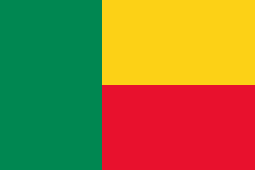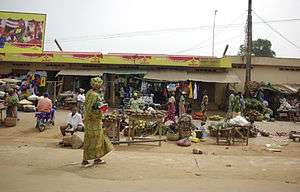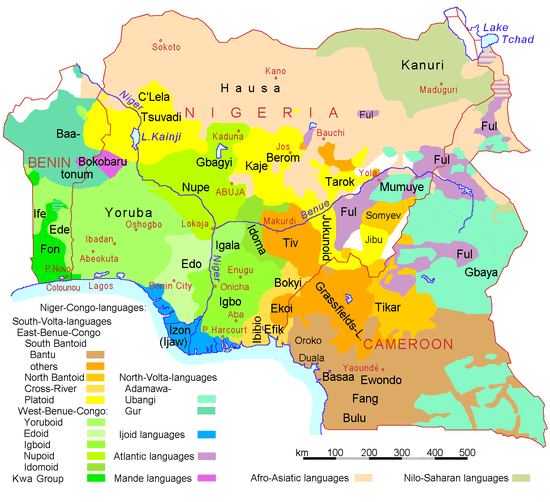Languages of Benin
| Languages of Benin | |
|---|---|
| Official languages | French |
| National languages | Fon, Fulfulde, Yoruba |
| Sign languages | American Sign Language (Francophone African Sign Language) |
| Other indigenous language(s) | Gen, Kabiyé |
| Part of a series on the |
| Culture of Benin |
|---|
 |
| History |
| People |
| Languages |
| Cuisine |
| Religion |
| Art |
| Literature |
|
Music and performing arts |
|
Monuments |
|
Symbols |
|

Benin is a diverse country linguistically. A total of 55 languages are spoken in Benin, with 50 being indigenous.[1] Of those, French is the official language, and all the indigenous languages are considered national languages.[2]
Of the Beninese languages, Fon (a Gbe language) and Yoruba are the most important in the south of the country. In the north there are half a dozen regionally important languages, including Bariba (once counted as a Gur language) and Fulfulde.
Education for the deaf in Benin uses American Sign Language, introduced by the deaf American missionary Andrew Foster.
The multilingual character of Beninese society is characterized by the number of languages spoken, ethno-linguistic diversity, stratification of language use (whereby French is used officially and other languages used in other spheres of activity), and by the fact that many Beninese are polyglots.[3]
French language in Benin
The official language of Benin is French, spoken by 35% of the population, about 4 million people. It is important to know to get an administrative position or work in the cities in general, and speaking French is a mark of prestige. According to a study by Amadou Sanni and Mahouton Atodjinou in 2012, it is estimated that Benin will be completely Francophone by 2060. The authors note that, in 2002, 43 percent of men spoke the language compared to 25.8 percent of women. In 2002, more than half of the residents of Cotonou spoke French.[4] French was introduced during the colonial period and retained as the official language upon independence. Today it is an important lingua franca between diverse ethnic groups.[5]
Although the Constitution grants freedom of expression, all printed media outlets are in French and not the indigenous languages. Benin is a member of the Organisation internationale de la francophonie.[6] The region of Benin Gi-Mono is a member of the International Association of Francophone regions.[7]
A unique variety of French called français d'Afrique has developed in the streets and markets of Cotonou. Grammatical structures are typically borrowed from the speaker's first language. It is especially the conjugation rules that have been changed the most, especially the less common forms like the literary style. It has an almost argotic character.[5]
National languages

Fon is the most widely spoken indigenous language, spoken by 24% of the population. It is the first language of more than 17% of Benin's population.[8] The language is mainly spoken in the Atlantique, Littoral, Collines and Zou Departments.[9]
Other important languages are Yoruba, Bariba, Mina and Dendi.[9] Benin implemented a National Literacy and Adult Education Policy, which allowed adult speakers of national languages to use their languages for cultural advancement.[10]
In the capital of Porto Novo, the two main ethnoliguistic groups are Yoruba and Goun, with smaller population of Wemi, Seto, Tori, Xwala, Defi, and Tofin speakers. Yoruba newspapers from neighboring Nigeria are popular.[3]
Foreign languages
English is studied as a foreign language in secondary schools.[11] There is a high demand for English teachers in Benin.[12] English is emerging as an important language of trade in Benin due to it being the national tongue of Benin's regionally powerful neighbor Nigeria.[3]
Spanish was studied by 412,515 persons in Benin in 2014.[13]
References
- ↑ "Benin". Ethnologue. Retrieved 19 October 2016.
- ↑ (French) LaClerc, Jacques Bénin" dans L'aménagement linguistique dans le monde, Québec, TLFQ, Université Laval, 1 Feb 2010 (accessed 2 Nov 2012)
- 1 2 3 McLaughlin, Fiona (2011). The Languages of Urban Africa. Continuum Publishing. ISBN 1441158138.
- ↑ "La langue française dans le monde, Édition 2014.". Francophonie.org (in French). p. 7.
- 1 2 "Les formes de français à Cotonou". Oridev.org (in French). Retrieved 19 October 2016.
- ↑ Benin La Francophonie
- ↑ "Regions Francophones". Association Internationale des Regions Francophones (in French). Retrieved 19 October 2016.
- ↑ "Benin Description". Elan Afrique. Retrieved 19 October 2016.
- 1 2 Houngnikpo, Mathurin; Decalo, Samuel (2013). Historical Dictionary of Benin. Rowman & Littlefield. pp. 237–238. ISBN 0810871718.
- ↑ "The Languages Spoken in Benin". Study Country. EU Business School. Retrieved 19 October 2016.
- ↑ Facts About the Republic of Benin: Official Document University of Pennsylvania
- ↑ Collin, Simon (2005). The Guide to English Language Teaching Yearbook 2005. Modern English Publishing. p. 153. ISBN 190454908X.
- ↑ "Espanol en el mundo" (PDF). Spanish government. Retrieved 19 October 2016.